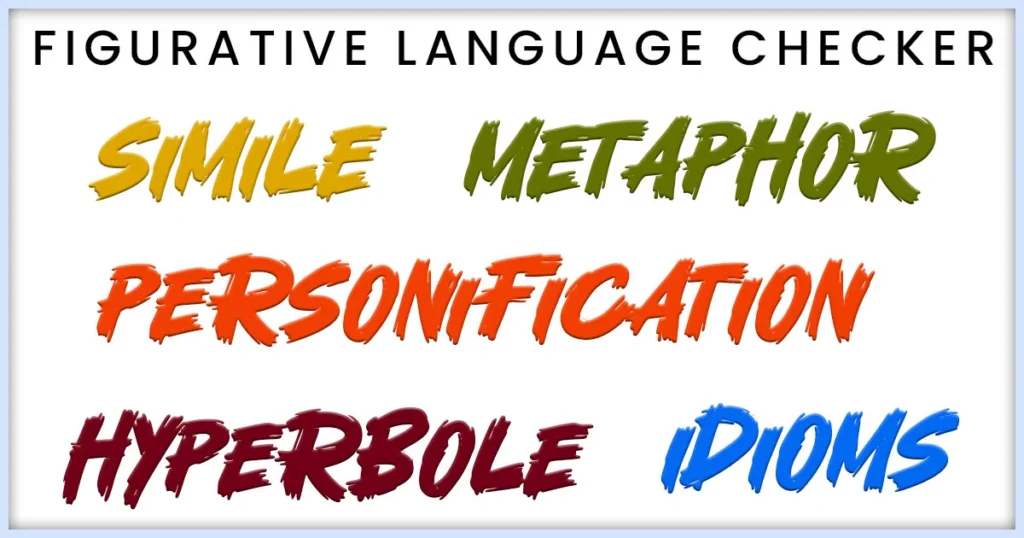Free Online Figurative Language Checker!
Enhance your writing effortlessly with our figurative language detector. Try it now to enrich your writing!
Figurative language checker prompt:
In progress…
Free Online Figurative Language Checker!
Figurative Checker is an online free tool that scans your text and ultimately identifies figurative language elements like similes, metaphors, and personification. This advanced figurative language checker provides valuable insights to its users, allowing them to improve and refine their writing easily.

Our figurative language detector will help you make your text more expressive and even more colorful. It provides literary depth to your writing by assisting you in identifying and comprehending figures of speech. Try it now to improve your writing skills!
How Our Figurative Language Checker Operates
Our Figurative Language Checker works quickly and accurately to improve the caliber of your writing. This online tool carefully and methodically scans your text using sophisticated algorithms to find different figurative language elements.
Check Various Types Of Figurative Language in One Click
Our Figurative Language Identifier makes exploring your text’s figurative language quick and hassle-free. You can analyze your content for figurative language types with a single click.
How does the tool find out which figurative language is used in a particular piece of writing?
We will address that later!
But Let’s first understand different types of figurative language.

Why Integrate Figurative Language into Your Text?
Integrating figurative language and figures of speech into your text adds depth and vividness to your writing. These creative elements can engage your readers, convey complex ideas more vividly, and make your content memorable.
However, using figurative language effectively requires some experience. Without it, your writing may not achieve its full potential and might not convey your intended message as clearly. You can get the help of online tools to get a better experience using the figure of speech.
Understand The Types of Figurative Language
Explore the beauty of figurative language through various forms, including similes, metaphors, personification, and more, enriching your writing with expressive elements.
1. Simile
Similes are a form of figurative language used to draw comparisons between two distinct things by employing the words “like” or “as.” They enrich writing by making it more vivid and relatable, allowing readers to visualize and connect with the text. Writers use similes to convey complex ideas or emotions in a more accessible manner.
Example:
His voice was as smooth as silk, calming my nerves with each word.
In the example, the simile “as smooth as silk” compares the person’s voice to the smoothness of silk, adding vividness to the description.
To ensure the precise and effective use of similes in your writing, using simile checkers can help you spot and refine these comparisons.
2. Metaphor
Metaphors are a form of figurative language that creates direct comparisons between two seemingly unrelated things, suggesting that one thing is another. They add depth and layers of meaning to writing by evoking imagery and symbolism.
Example:
Her laughter was music to his ears.
In this sentence, the metaphor is “Her laughter was music,” implying that her laughter brought joy and pleasure, much like music does. Metaphors, like this example, are used to create strong visual or emotional connections for readers.
To identify and utilize metaphors effectively in your writing, consider using an online tool like a metaphor checker and get better results.
3. Personification
Personification is a figurative language device that attributes human qualities and characteristics to non-human objects or animals, making them appear more relatable and human-like.
Example:
The wind whispered secrets in the trees’ ears.
In this sentence, the term “the wind whispered secrets” personifies the wind by giving it the human ability to whisper and share secrets, creating a vivid, human-like image.
4. Hyperbole
Hyperbole is a figurative language device characterized by exaggerated statements or claims not meant to be taken literally. It adds emphasis and often humor to writing.
Example:
I’ve told you a million times to clean your room.
In this sentence, the hyperbole is “a million times,” exaggerating the frequency of the request for emphasis.
Utilize our tool as a hyperbole checker to identify and refine hyperbolic expressions in your writing.
5. Idioms
Idioms are phrases or expressions that possess a figurative meaning different from their literal interpretation, often culturally specific and not easily deduced from their individual words.
Example:
It’s raining cats and dogs.
This idiom does not literally mean that animals are falling from the sky; rather, it indicates heavy rainfall. Idioms can be confusing when taken literally but add color and richness to language.
For refining and understanding idiomatic expressions, figurative language can work as an idiom checker.
Question
Frequently Asked Questions
Contact Us
Get in Touch
Simply fill out the form, and we'll be in touch promptly to address your inquiries or feedback.
Get the Most from Figurative Language
To make the most of figurative language, use the figurative language finder with a simple copy and paste of your text. It enhances your writing, making it more engaging and expressive, whether you're a student, a writer, or someone seeking creative expression.
Benefits for Students
- Academic writing skills
- Creativity and expression
- Deepen understanding of literary techniques
- Essays, presentations, and assignments
- Stand out with engaging and expressive content


Benefits for Writers
- Perfecting writing skills
- Fostering creativity and expression
- Deepening understanding of literary techniques
- Enhancing the quality of articles, stories, and creative works
- Standing out with engaging and expressive content
